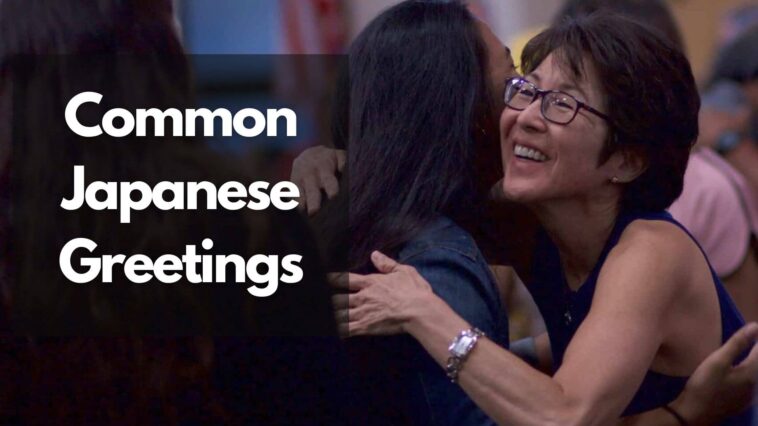As a gaijin or foreigner in Japan, you should know some of the basic Japanese greetings to use. This will make interacting with the locals in Japan easier and they will also appreciate the fact that you’re putting in some effort to learn their language.
Stepping into the world of Japanese? Greetings are your first step! This guide unlocks essential phrases for saying hello, goodbye, and more, all wrapped in politeness. Get ready to make a great first impression in Japanese!
Here’s a quick summary of basic Japanese greetings to use:
| Basic Japanese Greetings To Use | Meaning |
| Ohayō gozaimasu | Good Morning |
| Konnichiwa | Hello or Good afternoon |
| Konbanwa | Good Evening |
| Oyasumi nasai | Good Night |
| Sayōnara | Bid Goodbye |
| Moshi moshi | Say hello on the phone |
| Ittekimasu | I’ll go and come back |
| Itterasshai | Please go and come back |
| Tadaima | I have come back now |
| Okaeri | Welcome back |
Greeting in Japanese is 挨拶 (aisatsu) and it doesn’t just mean hello. Saying hello, in many western cultures, ranges from a quick smile or a slight nod. However, in Japan, aisatsu or greeting each other is considered extremely important and is in fact taught to kids from early childhood.

It’s not uncommon to see kids in school greet their senior students or colleagues greeting each other in an office. This helps promote a positive environment and attitudes.
Another thing I love about Japanese greeting is that bowing is much more common than handshaking. And especially, during this COVID era, bowing at each other is way better than a handshake – shows more respect plus you can maintain social distance.
If you’re going to Japan, make sure you learn these basic Japanese greetings as it’s deeply ingrained in Japanese culture. This should definitely be one of the first things to learn when learning basic Japanese.
Now let’s move on to learning some of the most common, important and basic Japanese greetings to use!
Page Contents
Basic Japanese Greetings To Use
Ohayō gozaimasu
Basic Japanese Greetings To Use To Say Good Morning
Ohayō gozaimasu (おはようございます ) in Japanese greeting roughly translates to good morning. It is pronounced as o-ha-yo-go-zai-mas. Use this Japanese greeting in the morning hours before noon. The base word in Ohayō gozaimasu is hayai (早い) which means early. So you’ll notice that the word morning isn’t part of this greeting.
If you’re greeting a close friend or family and would like to be more casual, you can just say Ohayo. If you’re greeting someone who is outside your immediate circle and someone way older than you then use the full phrase Ohayō gozaimasu.
In Japan, whenever you see someone you know, even if it’s an acquaintance you have to greet them as soon as you see them. Be it a junior in your office or the manager.
If you’re a greeting a colleague say:
- san, ohayou (さん、おはよう)
If you’re greeting a chief say:
- kachou, ohayou gozaimasu (課長、おはようございます)
Other ways to use Ohayō gozaimasu
Ohayō gozaimasu is not just used to say good morning. This greeting is the easiest way to start a conversation with a Japanese person. Japanese people do indulge in a lot of small talk – like how’s the weather? Or talk about the season?
Some other common topics of conversation are news, sports, cultural events. These small talks help you break the ice and build rapport with the other person. And in general helps you get along with the others.
- Related: Basic Japanese Words To Use
- Related: Best Japanese Anki decks
- Related: Why Learning Japanese is Difficult
Here are some examples using the basic Japanese greeting Ohayō gozaimasu
#1 — Ohayou gozaimasu. Kyou mo asa kara atsui desu ne.
Meaning: Good morning. Today too, it is hot from the morning.
Japanese: おはようございます。今日も朝から暑いですね
Transliteration: O-ha-yo-go-zai-mas. Kyo-mo-asa-karaatsui-de-su-ne
#2 — Ohayou gozaimasu. Kinou no sakkaa- mimashita? Sugokatta desune
Meaning: Good morning. Did you watch football last night? It was really great.
Japanese: おはようございます。昨日のサッカー見ました?すごかったですね。
Transliteration: O-ha-yo-go-zai-mas. Ki-no-no-sakka-mi-mush-ta? Su-go-katta-de-su-ne
#3 — Ohayou gozaimasu. Kinou ha doumo gochisousamadeshita.
Meaning: Good morning. Thank you for yesterday’s feast.
Japanese: おはようございます。昨日はどうもご馳走様でした
Transliteration: O-ha-yo-go-zai-mas. Ki-no-wa-do-mo-go-chi-so-sa-ma-desh-ta
Related: Easy Japanese For Food Ordering
Konnichiwa
Basic Japanese Greetings To Use To Say Hello or Good afternoon
Konnichiwa (こんにちは) is one of the most popular and basic Japanese greetings to use. It roughly translates to ‘hello’ and is usually used between 11:00 am and 5:00 pm as it literally means ‘today’ or ‘the sun’ and so it makes sense to use it while the sun is still shining. It is pronounced as Kon-ni-chiwa
It can also be used to greet someone good afternoon in Japanese.
Konnichiwa can be used to greet anybody and at any occasion. With close friends and family you use more casual Japanese greetings. If you’re not sure which is the most appropriate Japanese greeting – Just say Konnichiwa!
Related: Japanese for Washing Machines and Dryers
Konbanwa
Basic Japanese Greetings To Use To Say Good Evening
Konbanwa (こんばんは!) is another one of the most basic Japanese greetings to use. It roughly translates to good evening but the literal meaning of the word Konbanwa is ‘tonight’.
So you can use this basic Japanese greeting after the sun goes down. But know that, this is a more formal greeting and is not usually used amongst close friends and family.
In conversation, Konbanwa is used just like how you’d use Ohayou gozaimasu to start a conversation.
Here are some examples using the basic Japanese greeting Konbanwa:
#1 — Konbanwa! Kyounotestodoudatta?
Meaning: Good evening! How was the test today?
Japanese: こんばんは!今日のテストどうだった?
Transliteration: Kon-ban-wa! Kyo-no-tes-tu–do–datta
#2 — Konbanwa! Kyouwa ichinichijuu amefutteimashitane
Meaning: Good evening! It was raining all day today, wasn’t it?
Japanese: こんばんは!今日は一日中雨降っていましたね。
Transliteration: Kon-ban-wa! Kyo-wa-nitchhu- ame-futte-imash-ta-ne
#3 — Konbanwa! Nomini ikimashou!
Meaning: Good evening! Let’s go and have a drink!
Japanese: こんばんは!飲みにいきましょう!
Transliteration: Kon-ban-wa! no-mi-ni-iki-ba-sho!
Related: How Japanese Call Their Parents
Oyasumi nasai
Basic Japanese Greetings To Use To Say Good Night
Oyasumi nasai is also another of the basic Japanese greetings you should know. It literally means ‘please rest’ or ‘have a good rest’.
Oyasumi is a more casual version of good night and can be used amongst close friends and family. But if you’re saying good night to someone superior then always use the full phrase Oyasumi nasai.
If you’re going to bed, you can wish the other person good night saying Oyasumi nasai or if your friend is going to bed and wishes you Oyasumi nasai, you say the same greeting back.
Or if it’s late in the night and you’re taking the last train with your friends or collegue, you can say Oyasumi nasai as you bid them goodbye.
Related: What Japanese Say Before Eating
Sayōnara & gokigenyō
Basic Japanese Greetings To Use To Bid Goodbye
Sayonara literally means ‘if it is so’. And, historically, speaking it was used along with another word gokigenyō, meaning “farewell,”. The complete greeting would be Sayonara gokigenyō, to mean if it is so, farewell. Eventually people dropped the gokigenyō, and preferred to just Sayonara to mean goodbye.
In contrast to popular belief, Sayonara is not really a widely used term amongst the Japanese locals. More commonly words used to convey the same thing is: bye-bye (バイバイ), jaane (じゃあね), dewa (では) or mata ne (またね).
Related: How Japanese Write Dates
Moshi moshi & osewa
Basic Japanese Greetings To Use Over The Phone
This basic Japanese greeting is very particular to phone conversations. Moshimoshi is heard at the beginning of a phone conversation, making sure that people on both sides of the phone can hear each other.
Today, a more polite way to answer the phone is ‘Hai’ or ‘yes’ and then followed by your name.
Related: How Japanese Names Work
Ittekimasu & itterasshai
Basic Japanese Greetings To Use When Someone Leaves The House
This is a specific Japanese greeting to use when someone leaves the office or house. It literally translates to “I’ll go and come back,” and the person that stays back at home or office says itterassha “please go and come back.” This Japanese greeting makes sense when someone will go and come back.

Tadaima & okaeri
Basic Japanese Greetings To Use When Returning Home or Office
Like Ittekimasu, Tadaima is a basic Japanese greetings to use when you return home or to the office. It literally translates to “I have come back now.” And if someone says this greeting to you then you reply with okaeri which translates to welcome back.

Otsukaresama desu
This is probably the most basic Japanese greetings to use in the workplace. To translate this is a bit complicated. This word originates from the verb tsukareru (疲れる) which translates to ‘to get tired’.
Otsukaresama desu is said as a sign of mutual support or hard work. It is usually said at the end of a hard working day at the office.
Yōkoso & irasshaimase
This is the basic Japanese greetings to use at the airport or, stores, and restaurants when you intend to welcome somebody. Which is why you’ll hear it at the airport a lot!
When you enter a restaurant or store in Japan, you’ll also hear this greeting yōkoso. This just means welcome and the other person is not really expecting any response.
Sumimasen
The Japanese word sumimasen (すみません) is a versatile word that can be used in a variety of situations. It can mean “excuse me,” “I’m sorry,” “thank you,” or even “please.” The exact meaning of sumimasen will depend on the context in which it is used.
Here are some examples of how sumimasen can be used:
- Excuse me. If you need to get someone’s attention, you can say “sumimasen.” For example, if you are trying to get through a crowded train, you might say “sumimasen” to people as you move through them.
- I’m sorry. If you make a mistake or do something wrong, you can say “sumimasen” to apologize. For example, if you bump into someone, you might say “sumimasen.”
- Thank you. Sumimasen can also be used to express gratitude. For example, if someone holds the door open for you, you might say “sumimasen.”
- Please. In some cases, sumimasen can be used to ask for something politely. For example, if you are asking someone to pass you something, you might say “sumimasen.”
Itadakimasu
The Japanese word itadakimasu (いただきます) is a polite phrase that is said before eating a meal. It is a way of showing gratitude to the people who prepared the food, as well as to the natural world that provided the ingredients.
The literal meaning of itadakimasu is “I humbly receive.” This reflects the Japanese cultural value of humility and respect. When you say itadakimasu, you are acknowledging that you are receiving a gift, and that you are grateful for the effort that went into preparing the meal.
Itadakimasu is also a way of showing appreciation for the natural world. The food that we eat comes from plants and animals, and it is important to remember that these living things have given their lives so that we can eat. By saying itadakimasu, we are acknowledging this sacrifice and expressing our gratitude.
Itadakimasu is a common phrase in Japanese culture, and it is used in a variety of settings. It is typically said before a meal, but it can also be said before receiving a gift or any other kind of offering.
Here are some examples of how itadakimasu can be used:
- Before a meal: When you are about to start eating a meal, you would say “itadakimasu.”
- Before receiving a gift: If someone gives you a gift, you would say “itadakimasu” to show your gratitude.
- Before receiving an offering: If someone offers you something, such as a piece of fruit, you would say “itadakimasu” to show that you accept it.
Hajimemashite
The Japanese word hajimemashite (はじめまして) is a formal greeting that means “nice to meet you.” It is typically used when meeting someone for the first time, and it is a way of showing respect.
The literal meaning of hajimemashite is “the beginning of a meeting.” This reflects the Japanese cultural value of starting things off on the right foot. When you say hajimemashite, you are acknowledging that this is the beginning of a new relationship, and that you are eager to get to know the other person.
Hajimemashite is a common phrase in Japanese culture, and it is used in a variety of settings. It is typically said when meeting someone in person, but it can also be said over the phone or through email.
Here are some examples of how hajimemashite can be used:
- When meeting someone for the first time: When you meet someone for the first time, you would say “hajimemashite.”
- When introducing yourself: If you are introducing yourself, you would say “hajimemashite, [your name] desu.”
- When responding to hajimemashite: If someone says “hajimemashite” to you, you would say “hajimemashite” back.
Arigatou gozaimasu
The Japanese word arigatou gozaimasu (ありがとうございます) is a polite way of saying “thank you.” It is the most common way to express gratitude in Japanese, and it can be used in a variety of situations.
The literal meaning of arigatou gozaimasu is “I am grateful.”
This reflects the Japanese cultural value of gratitude. When you say arigatou gozaimasu, you are acknowledging that you have been helped or given something, and that you are grateful for the other person’s kindness.
Arigatou gozaimasu is a common phrase in Japanese culture, and it is used in a variety of settings. It can be used to thank someone for a favor, for a gift, or for simply being kind.
Here are some examples of how arigatou gozaimasu can be used:
- To thank someone for a favor: If someone does something for you, you would say “arigatou gozaimasu.”
- To thank someone for a gift: If someone gives you a gift, you would say “arigatou gozaimasu.”
- To thank someone for being kind: If someone is kind to you, you would say “arigatou gozaimasu.”
Gomen nasai
The Japanese word gomen nasai (ごめんなさい) is a common way to say “I’m sorry” in Japanese. It is a versatile word that can be used in a variety of situations, from formal to informal.
The literal meaning of gomen nasai is “I humbly apologize.” This reflects the Japanese cultural value of humility and respect. When you say gomen nasai, you are acknowledging that you have done something wrong, and that you are sorry for the inconvenience or hurt that you have caused.
Gomen nasai is a common phrase in Japanese culture, and it is used in a variety of settings. It can be used to apologize for a mistake, for hurting someone’s feelings, or for simply being in someone’s way.
Here are some examples of how gomen nasai can be used:
- To apologize for a mistake: If you make a mistake, you would say “gomen nasai.”
- To apologize for hurting someone’s feelings: If you hurt someone’s feelings, you would say “gomen nasai.”
- To apologize for being in someone’s way: If you are in someone’s way, you would say “gomen nasai.”
How do you greet someone in Japan?
Here are some common ways to greet someone in Japan:
- Konnichiwa (こんにちは) – This is the most common way to say “hello” in Japanese. It can be used in any situation, formal or informal.
- Ohayo gozaimasu (おはようございます) – This means “good morning” in Japanese. It is used from sunrise to noon.
- Konbanwa (こんばんは) – This means “good evening” in Japanese. It is used from noon to sunset.
- Moshi moshi (もしもし) – This is used when answering the phone. It literally means “is it me?”
- Hajimemashite (はじめまして) – This means “nice to meet you” in Japanese. It is used when meeting someone for the first time.
- Dōmo arigatou gozaimasu (ありがとうございます) – This means “thank you” in Japanese. It is a formal way to express gratitude.
- Osaki ni nasai (お先に失礼します) – This means “excuse me” or “I’ll be going now” in Japanese. It is used when leaving a place.
What is Moshi Moshi?
Moshi moshi (もしもし) is a Japanese phrase that is used when answering the phone. It literally means “is it me?”, but it is more commonly translated as “hello”. The word “moshi” comes from the verb “mousu” (申す), which means “to say”. So, “moshi moshi” can be thought of as a polite way of saying “I am speaking”.
What is the reply to konichiwa?
The most common reply to konnichiwa (こんにちは) is simply konnichiwa (こんにちは). This is a polite way of saying “hello” in Japanese. It can be used in any situation, formal or informal.
Here are some other possible replies to konnichiwa:
- Hajimemashite (はじめまして) – This means “nice to meet you” in Japanese. It is used when meeting someone for the first time.
- Genki desu ka (元気ですか) – This means “how are you?” in Japanese. It is a polite way to ask someone how they are doing.
- Okaeri nasai (おかえりなさい) – This means “welcome home” in Japanese. It is used when someone is returning home.
- Dōmo (どうも) – This is a general-purpose word that can be used to express gratitude, agreement, or understanding.
What is the reply of ohayo?
Here are some other possible replies to ohayo:
The most common reply to ohayo (おはよう) is simply ohayo (おはよう). This is a casual way of saying “good morning” in Japanese. It is used between friends, family, and close acquaintances.
- Ohayo gozaimasu (おはようございます) – This is a more formal way of saying “good morning” in Japanese. It is used when greeting someone you do not know well, or in a more formal setting.
- Genki desu ka (元気ですか) – This means “how are you?” in Japanese. It is a polite way to ask someone how they are doing.
- Dōmo (どうも) – This is a general-purpose word that can be used to express gratitude, agreement, or understanding.
Also Read:





